Situations like Karachi lead to military takeovers: Chief Justice
CJ says breakdown in law and order always used by army to send democratic governments packing.
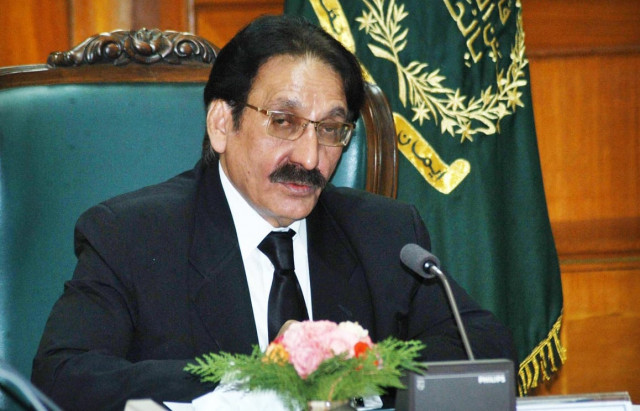
The five-member bench, which is headed by Justice Chaudhry, said it was not happy with the “one-sided” arguments being presented by Muttahida Qaumi Movement (MQM) counsel Farogh A Naseem.
The chief justice asked why the MQM had not presented a list of other innocent people killed in Karachi and why only a list of party workers and supporters had been presented.
During the hearing, the MQM counsel also accused the Awami National Party (ANP) and Lyari gang members of involvement in incidents of kidnappings and killings. The chief justice asked where the names of ANP members accused of target killings were in the First Information Reports (FIR) filed.
The MQM counsel said more than 36 people had been killed and their homes torched in Pashtun-dominated areas on August 13. He argued that the MQM had pointed out 26 points in the city where there was a dire need of setting up checkposts.
The MQM counsel also requested the court to review Zulfiqar Mirza’s statement in which he claimed to have issued 300,000 thousand arms licences.
Advocate General (AG) of Sindh Abdul Fatah Malik had earlier presented a report on the 1992 Army Operation in Karachi to the bench as the suo motu hearing on violence in the city resumed.
Meanwhile, Baloch Ittehad counsel Jameel Ahmed has requested the court to call in the army to control the law and order situation in Karachi.
Officials of the Inter-Services Intelligence (ISI) have arrived in court and will be appearing before the bench.
On Tuesday, Chief of the paramilitary Pakistan Rangers Sindh had called Karachi’s situation graver than that of terrorism-hit South Waziristan but solvable once the state decides to act against criminals.
“Karachi, unfortunately, has political, ethnic and religious polarisation. The problem begins as an ethnic one but once that is quelled, religious violence erupts,” Maj-Gen Ijaz Chaudhry told the five-member bench of the Supreme Court.
Updated from Print edition (below)
Karachi violence: Democracy must deliver now, says SC
The men in uniform have always used a breakdown in law and order to send a democratic government packing, the Supreme Court chief justice has said, warning a seemingly hapless democratic government to put its act together and secure Karachi.
“We have closed the door on a military intervention but at the same time, democracy has to deliver while adhering to the Constitution,” Chief Justice Iftikhar Muhammad Chaudhry said, as the court continued its proceedings into the Karachi violence suo motu case on Thursday.
The bench, which had earlier criticised Sindh’s police force for inherent weaknesses in its investigations, dwelled on the failings of the political system which had led to the massacre in Karachi that saw over 400 people killed.
“The entire situation in Karachi is due to the policy of remaining in or grabbing power,” said a member of the bench. “If all political parties expel criminal elements [within their ranks], Sindh can become the safest area.”
Referring to appointments at senior police positions, the CJ said that as many as 14 officers who had been posted had no training. “We have a list. People from [unrelated organisations such as] the Pakistan Electronic Media Regulatory Authority (Pemra) and National Accountability Bureau (NAB) were brought in. Two of them are retired military colonels. They had never seen a police academy,” he said, addressing the Muttahida Qaumi Movement’s (MQM) counsel Farogh Naseem who opened the party’s arguments at the hearing.
“Why did the MQM keep quiet on such postings?” the CJ asked.
“The MQM repeatedly opposed such appointments but as coalition partners, we were powerless and hence left the coalition,” Naseem said.
But the bench rejected the argument, saying the MQM had stuck to its government. “The parties in the coalition must be more worried about bodies in gunny bags than clinging to power,” observed Justice Sarmad Jalal Osmany.
“Why is the situation’s gravity not being realised?” the CJ said. “It will invite those who come and say ‘my dear countrymen’,” he said, referring to the army.
(Read: Army voices its concerns over Karachi)
Naseem reiterated that the MQM had walked out of the coalition for the people’s sake. “No, you came out for yourself,” Justice Osmany responded.
“Improved law and order is in the interest of the party and the people it represents,” the MQM counsel said. “MQM is a clear and most dominant stakeholder,” Naseem said, citing the results of the 2008 general elections.
Giving figures of MQM workers and supporters killed between 2008 and 2011, Naseem said that the party remained in the coalition as “a powerless component” to keep Karachi stable and avoid derailment of democracy.
Holding the Peoples’ Amn Committee responsible for killing party workers, MQM alleged complicity between rival parties against MQM.
He said that either the chief justice or a high court judge be appointed to monitor police investigations. “Do you want us to appoint a judge as IG police?” the CJ asked.
Later, the bench was briefed by officials of the Inter-Services Intelligence agency (ISI) in the committee room. Attorney-General of Pakistan Maulvi Anwarul Haq had earlier informed the bench about the briefing and requested confidentiality.
Hearing was adjourned till Friday, after which the bench will resume proceedings on September 13.
Meanwhile, the Supreme Court has been requested to summon MQM chief Altaf Hussain, former Sindh home minister Zulfiqar Mirza and Interior Minister Rehman Malik in the light of accusations that they have levelled on each other.
The petition has been filed by Advocate Tariq Asad who had earlier moved the court to call the army in Karachi.
“Whether any political party operating in a manner prejudicial to the sovereignty or integrity of Pakistan or indulging in terrorism is not liable to be dissolved/banned under Articles 15 and 16 of Political Parties Order 2002?” the lawyer has asked in his petition.
If the allegations levelled against the MQM are proved, the party and other parties should be banned and the federation should be directed to call the armed forces to conduct a clean-up operation in aid of civil power, Asad prayed.
(With additional reporting by Qaiser Zulfiqar in Islamabad)
Published in The Express Tribune, September 9th, 2011.


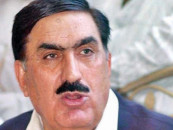
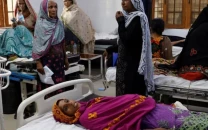

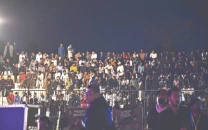
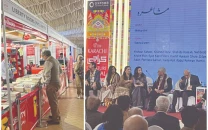











COMMENTS
Comments are moderated and generally will be posted if they are on-topic and not abusive.
For more information, please see our Comments FAQ